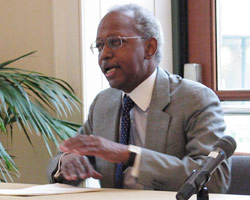A former appointee to the Securities and Exchange Commission and dean of two law schools, Isaac C. Hunt Jr., a 1962 graduate of the University of Virginia School of Law, died Sunday, in Washington, D.C. He was 80.
Known to his friends and family as “Ike,” Hunt was UVA Law’s second black graduate. He went on to become a trailblazer in both public and private practice, as well.
President Bill Clinton nominated Hunt as a commissioner of the SEC in 1995. The Senate confirmed him the following January, and he was sworn in on Feb. 29, 1996. He was nominated again by President George W. Bush as a recess appointee and served until August 2002.
Hunt’s work at the SEC was noted for helping to better define relationships between the commission and international securities regulators.
As a public servant, Hunt also served as principal deputy general counsel and acting general counsel at the U.S. Department of the Army under the Carter and Reagan administrations.

Prior to the SEC, Hunt served for eight years as dean at the University of Akron School of Law beginning in 1987 — also teaching as a professor of law for seven of those years.
Before that, he served for four years as dean and professor of law at the former Antioch School of Law in Washington, D.C., which created opportunities for numerous low-income African-Americans to enter the legal field.
He cut his teeth as a law professor at Catholic University.
In private practice, Hunt was an associate at Jones, Day, Reavis & Pogue, serving in the corporate and securities practice section. He specialized in government procurement litigation, administrative law and international trade.
Early in his career, Hunt wrote two influential reports: "The Aftermath of Disorder," which was included as a portion of the larger report issued in 1968 by the National Advisory Commission on Civil Disorders, also known as the Kerner Commission, examining race riots in 1967; and "Minority Recruiting in the New York City Police Department," issued in 1971 by the RAND Corp.
Hunt’s career began as a staff attorney at the SEC, where he worked from 1962 to 1967.
During a roundtable discussion among African-American UVA Law graduates held at the Law School in 2004, Hunt said that he assumed when he started at the SEC that the federal agency would have been integrated, but he found that he was the only black lawyer on staff.
In 1998, Hunt was the first alumnus to return to the Law School through the Profiles from Practice program, which arranged visits from graduates who had achieved high distinction.
Professor Mildred Robinson, a longtime friend, was among those in the UVA Law community mourning Hunt’s death this week.
“Ike was a talented and elegant man as well as a good and supportive friend and ally,” Robinson said.
Robert A. Williams ’69, a cousin and attorney with Williams, Luck & Williams in Martinsville, Virginia, remembered Hunt fondly for his contributions to the legal field and to family.
“Ike's intelligence and accomplishments served as incentives for his extended family,” Williams said. “He will be missed.”
Before entering the Law School in 1959, Hunt studied architecture at Columbia University.
He also attended Fisk University in Nashville, Tennessee, starting at age 15. He graduated with a double major in math and economics in 1957.
Hunt was born on Aug. 1, 1937, in Danville, Virginia.
In his later years, Hunt continued to keep a hand in securities law issues. He served on the board of The Professional Directors Institute, whose clients are public companies that seek to maintain SEC compliance.
Throughout his career, he spoke extensively on civil rights, legal education and securities law, both in the U.S. and abroad.
Hunt’s wife, Elizabeth R. “Betty” Hunt, preceded him in death. He leaves a son, Issac C. Hunt III; a daughter-in-law, Michelle; and two grandchildren, Freeman and Ellington. He was active in the lives of his grandchildren.
A service in memory of Hunt will be held at the SEC on Dec. 1, starting at 4:30 p.m. The address is 100 F. St. NE, in Washington, D.C.
Founded in 1819, the University of Virginia School of Law is the second-oldest continuously operating law school in the nation. Consistently ranked among the top law schools, Virginia is a world-renowned training ground for distinguished lawyers and public servants, instilling in them a commitment to leadership, integrity and community service.


